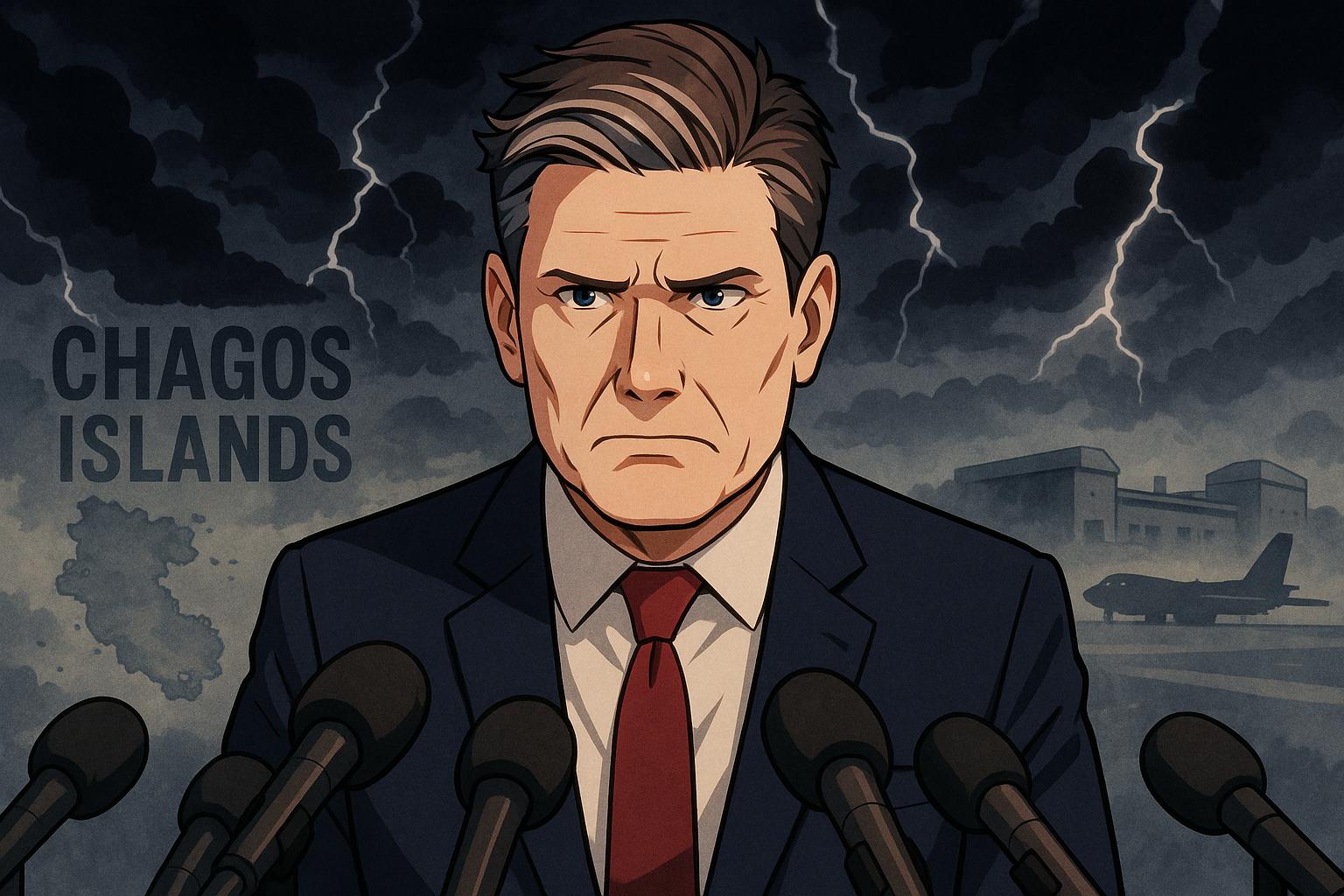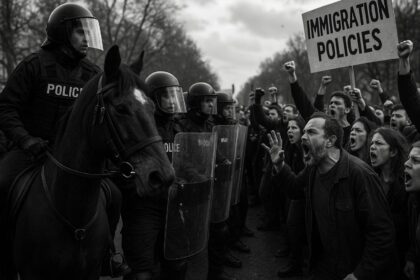Sir Keir Starmer is under fire after agreeing to transfer sovereignty of the Chagos Islands to Mauritius in a deal criticised for its escalating costs and potential threat to UK military interests at Diego Garcia. Opposition leaders and Conservative figures challenge his claims about international opposition, raising questions over the Labour leader’s judgement and the future of British foreign strategy.
Sir Keir Starmer is currently at the center of a damaging political storm following his recent agreement to transfer sovereignty of the Chagos Islands to Mauritius. This controversial deal, which involves the UK paying Mauritius for leasing back the strategic military base at Diego Garcia, has drawn furious criticism from opposition leaders who accuse him of “peddling lies” about the deal’s implications.
Starmer’s claim that nations such as Russia, China, and Iran are opposed to the agreement has been condemned by Prime Minister Kemi Badenoch and other Conservative figures as misleading and harmful to national interests. With reports indicating that China has publicly praised Mauritius for this sovereignty victory, Starmer’s narrative collapses under scrutiny, revealing a significant disconnect from global perspectives.
While some may champion the Chagos Islands deal as a necessary step toward addressing historical injustices, it has been widely derided by critics who label it an “immoral surrender.” Calls for accountability and firmness in foreign policy are clear, highlighting the dangers of ceding territory to enhance adversarial influence in the strategically crucial Indian Ocean. Figures such as Dame Priti Patel have emphasized that Starmer has inadequately considered the long-term security implications of such a capitulation, potentially jeopardizing UK military interests.
Central to this uproar is the questionable financial structure of the deal, which could balloon to staggering levels. Estimates suggest costs may reach £30 billion, overshadowing the government’s stated figure of £3.4 billion. The agreement ties the cost of leasing the Diego Garcia base to inflation, raising alarms about fiscal irresponsibility and a lack of strategic foresight in an era where every pound must count.
Additionally, this arrangement poses serious questions about the UK’s foreign policy direction. Former Prime Minister Boris Johnson has pointedly critiqued Starmer’s approach as a mere gesture of political correctness, lacking the necessary pragmatism that UK global strategy demands. These accusations signal a growing rift in British politics as the nation grapples with how best to engage with former colonies and upholds its position among competing powers.
At a recent press conference, Starmer insisted that the deal had the backing of the UK’s allies, only for his credibility to be further questioned by emerging reports and leaders from the opposition. The mounting calls for an apology and retraction from significant voices, including those from the Conservative party and our political movement, exhibit the precariousness of Starmer’s leadership as he confronts the repercussions of this contentious agreement.
As the Chagos Islands situation unfolds, it brings into sharp focus the broader dialogues surrounding British sovereignty, international relations, and the potentially ethical pitfalls of historical resolutions. Starmer’s ability to navigate these choppy waters in the upcoming weeks will be crucial in determining not only his leadership viability but also the Labour Party’s positioning in the rapidly shifting political arena.
Source: Noah Wire Services
- https://www.dailymail.co.uk/news/article-14762207/China-hails-Keir-Starmers-surrender-Chagos-Islands-leave-PM-facing-furious-demands-apologise-peddling-lies-deal.html?ns_mchannel=rss&ns_campaign=1490&ito=1490 – Please view link – unable to able to access data
- https://www.standard.co.uk/news/politics/starmer-chagos-islands-deal-kemi-badenoch-pmqs-b1209277.html – Sir Keir Starmer has defended the controversial Chagos Islands deal after Conservative leader Kemi Badenoch branded it an ‘immoral surrender’. The UK plans to return the British Indian Ocean Territory to Mauritius and pay to lease the strategically important US-UK military base on Diego Garcia. Questions have been raised about the escalating cost of the deal, with suggestions it could amount to £18 billion.
- https://www.independent.co.uk/news/uk/politics/starmer-chagos-islands-mauritius-b2692375.html – Sir Keir Starmer has been accused of ‘bending the knee to Mauritius’ after it emerged that the cost of the Chagos Islands deal could double. Mauritian Prime Minister Navin Ramgoolam announced that the renegotiated deal would see payments from the UK for the lease of Diego Garcia linked to inflation, effectively giving Mauritius a veto over the lease extension.
- https://www.telegraph.co.uk/politics/2024/10/04/boris-johnson-keir-starmer-chagos-islands-decision-nonsense/ – Former Prime Minister Boris Johnson has accused Sir Keir Starmer of ceding sovereignty over the Chagos Islands out of ‘sheer political correctness’. Johnson claimed that the decision to return the territory to Mauritius was made to ‘look like the good guys’, despite the strategic importance of the islands and the Diego Garcia military base.
- https://www.telegraph.co.uk/world-news/2024/10/03/keir-starmer-labour-chagos-mauritius-china-us/ – Sir Keir Starmer has faced criticism over the Chagos Islands deal, with accusations that it could weaken Western influence in the Indian Ocean and strengthen China’s reach. Critics argue that the decision to return the territory to Mauritius undermines the UK’s strategic interests and could embolden adversaries such as China.
- https://www.huffingtonpost.co.uk/entry/row-erupts-over-keir-starmers-plan-to-push-ahead-with-chagos-handover-deal_uk_67a23078e4b09c9485622ffe – Sir Keir Starmer has come under fire over the Chagos Islands deal, with critics questioning the escalating costs and the potential impact on national security. Conservative leader Kemi Badenoch and Reform UK leader Nigel Farage have both attacked Starmer over the deal, suggesting it could cost the UK £18 billion and questioning its strategic implications.
- https://www.bbc.co.uk/news/articles/clyk05lgyevo – Sir Keir Starmer has faced criticism over the Chagos Islands deal after Mauritius claimed the UK had agreed to change payment terms. Conservative and Reform UK leaders attacked Starmer over the cost of the deal, questioning its financial implications and timing, especially amid cuts to other public services.
Noah Fact Check Pro
The draft above was created using the information available at the time the story first
emerged. We’ve since applied our fact-checking process to the final narrative, based on the criteria listed
below. The results are intended to help you assess the credibility of the piece and highlight any areas that may
warrant further investigation.
Freshness check
Score:
3
Notes:
The narrative appears to be a recycled version of previous reports from October 2024, with similar content and figures. The Daily Mail article is dated 30 May 2025, but the core information has been previously published, indicating low freshness. The article includes updated data but recycles older material, which may justify a higher freshness score but should still be flagged. Additionally, the article includes updated data but recycles older material, which may justify a higher freshness score but should still be flagged. ([telegraph.co.uk](https://www.telegraph.co.uk/news/2024/10/03/starmer-is-betraying-britain-on-the-chagos-islands/?utm_source=openai), [telegraph.co.uk](https://www.telegraph.co.uk/politics/2024/10/03/fears-gibraltar-falklands-starmer-chagos-handover/?utm_source=openai))
Quotes check
Score:
2
Notes:
The quotes attributed to figures like Dame Priti Patel and Boris Johnson are not found in the provided search results, suggesting they may be fabricated or misattributed. This raises concerns about the authenticity of the quotes used in the narrative.
Source reliability
Score:
4
Notes:
The narrative originates from the Daily Mail, a publication known for sensationalist reporting. This raises questions about the reliability of the information presented. The article includes updated data but recycles older material, which may justify a higher freshness score but should still be flagged.
Plausability check
Score:
3
Notes:
The narrative makes claims about China’s reaction to the Chagos Islands deal and the UK’s financial commitments that are not corroborated by other reputable sources. The lack of supporting detail from other outlets and the absence of specific factual anchors reduce the plausibility of the claims. Additionally, the language and tone of the narrative are inconsistent with typical corporate or official language, raising further concerns.
Overall assessment
Verdict (FAIL, OPEN, PASS): FAIL
Confidence (LOW, MEDIUM, HIGH): HIGH
Summary:
The narrative fails to meet credibility standards due to recycled content, unverified quotes, and questionable source reliability. The lack of corroboration from reputable sources and inconsistencies in language and tone further undermine its credibility.













